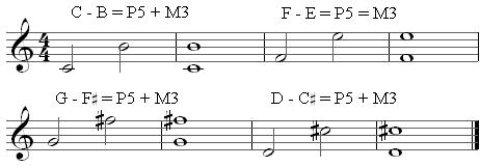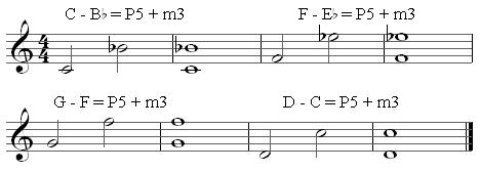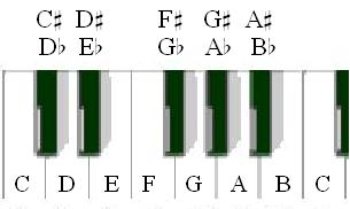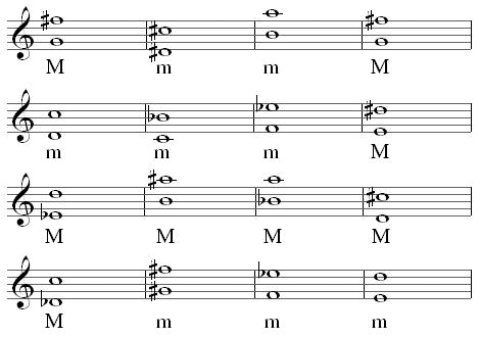Sevenths
seconds - thirds - fourths & fifths - sixths - sevenths
Perfect Intervals - Augmented Intervals - Diminished Intervals
7ths: Major & Minor
Sevenths are usually either major or minor. They can be "sweet" sounding and peaceful - or "active" and dissonant. When we explore chords and chord progressions we will see that sevenths very often determine the direction and progression of the harmony.
A major seventh consists of a P5 + M3; for example C to B is a major sixth (C to G = a P5 + G to B = a M3). (I tend to think of a major seventh as being a half step from the octave.)
A minor seventh consists of a P5 + m3; for example, C to Bb is a minor seventh (C to G = P5 + G to Bb = m3.) (I tend to think of a minor seventh as being a whole step from the octave.)
MAJOR SEVENTHS
Below are some examples of major sevenths. Each one consists of a
P5 = M3:

MINOR SEVENTHS
Below are the same intervals EXCEPT they have been changed from major sevenths to minor sevenths. They each consist of a P5 + m3:

If necessary, use the keyboard diagram below to visualize the whole step, half step construction these intervals.

Below are some MAJOR SEVENTHS on various chromatic notes. Each of these major sevenths consists of a P5 + M3. (Use the diagram above if necessary.)

Below are some MINOR SEVENTHS on various chromatic notes. Each of these minor sevenths consists of a P5 + m3. (Use the diagram above if necessary.)

MAJOR & MINOR SEVENTHS
The sevenths below are either major or minor.
- Major = M
- Minor = m
The major sevenths consist of a P5 + M3 - the minor sevenths consist of a P5 + m3.


seconds - thirds - fourths & fifths - sixths - sevenths
Perfect Intervals - Augmented Intervals - Diminished Intervals
Hi and Welcome!
Fill out the form below to sign up for the free periodic
Player's Guide Newsletter!
Get tips and ideas about substitute chords, chord progressions and harmonic movement.
Harmony and Theory:
by Carl Schroeder and Keith Wyatt





